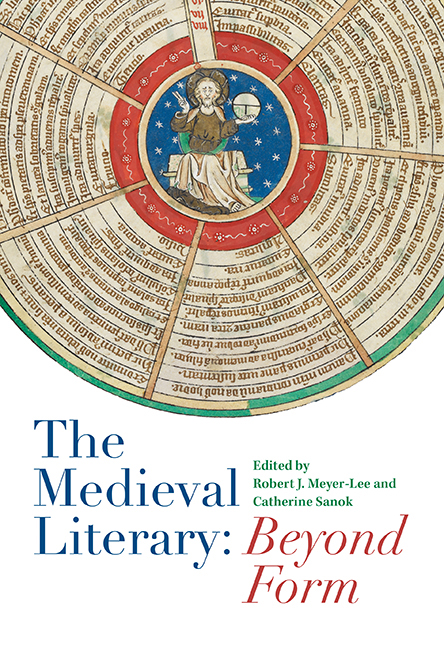Book contents
- Frontmatter
- Contents
- List of Illustrations
- Acknowledgments
- List of Contributors
- List of Abbreviations
- Introduction: The Literary through – or beyond? – Form
- I Instrumental Forms
- II Form Performed
- III Temporalities of Form
- 7 Translating Form with Patience
- 8 Terpsichorean Form: Geoffrey Chaucer's Franklin's Tale and Robert Smithson's Spiral Jetty
- 9 Illusion and Aspect in the Construction of the Face: Chaucerian Individuals, Chaucerian Types
- 10 Collecting, Violence, Literature: Richard de Bury's Philobiblon and the Forms of Literary History
- Index
9 - Illusion and Aspect in the Construction of the Face: Chaucerian Individuals, Chaucerian Types
from III - Temporalities of Form
Published online by Cambridge University Press: 12 October 2019
- Frontmatter
- Contents
- List of Illustrations
- Acknowledgments
- List of Contributors
- List of Abbreviations
- Introduction: The Literary through – or beyond? – Form
- I Instrumental Forms
- II Form Performed
- III Temporalities of Form
- 7 Translating Form with Patience
- 8 Terpsichorean Form: Geoffrey Chaucer's Franklin's Tale and Robert Smithson's Spiral Jetty
- 9 Illusion and Aspect in the Construction of the Face: Chaucerian Individuals, Chaucerian Types
- 10 Collecting, Violence, Literature: Richard de Bury's Philobiblon and the Forms of Literary History
- Index
Summary
[I]t is not the concreteness of invented or unexpected details (where we do find them) which produces individuality, for they are not essentially different from the concrete details that are a traditional part of estates satire. Moreover, invented details are used to extend the typical, just as well as the individual, aspects of a character […O]ur strong impression of the individuality of the figures in the Prologue is due to the fact that Chaucer encourages us to respond to them as individuals […] Chaucer calls forth contradictory responses – a positive emotional or sensuous response, conflicting with an expectation that moral disapproval is called for – in order to make us feel the complexity of his characters.
Jill Mann, Chaucer and Medieval Estates SatireChaucer's General Prologue poses a question of form that, in one way or another, haunts all literary representations of human characters. It is the question that Jill Mann set out to address in her 1973 book, a question she so successfully answered that very few have dared to investigate The General Prologue since. As she herself points out, it is in many ways the wrong question: “What is the relationship between type and individual, literary convention and actual person, in Chaucer's works?” The brilliance of Mann's answer lies in her recognition that particularity is not a guarantor of individuality; concrete details, as she shows throughout the book, are just as likely to be conventional as literary abstractions. If it is not particularity that vivifies character – that makes readers feel that Chaucer's pilgrims are “real people” – then Mann suggests that it is the fact that we experience contradiction and inconsistency in our engagement with them. We instinctively like a character of whom we disapprove. What Mann calls our “positive emotional or sensuous response” is intimately linked to our sense that these characters exist in changeable time, with pasts that are different from their presents, which will be different from their futures. That is why we can have contradictory feelings about them and why they can be inconsistent with themselves in Chaucer's descriptions. In this light, the dynamic between type and individual can be rewritten as “stasis and motion”: the type is the character not subject to change, whereas individuality is produced by the character in motion, whose identity changes from moment to moment, often in contradictory ways.
- Type
- Chapter
- Information
- The Medieval Literary: Beyond Form , pp. 213 - 242Publisher: Boydell & BrewerPrint publication year: 2018



